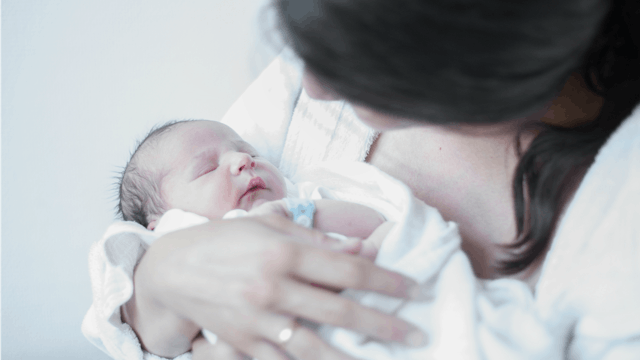9 Reasons Moms Don't Speak Up About Postpartum Depression

It’s hard to know for sure just how many women suffer from postpartum depression because so many cases remain unreported. It can be terrifying to speak up when we’re feeling down, but it is so important for our own mental health and to help bring awareness about this debilitating condition.
I suffered with postpartum depression in silence for a long time. When I finally did decide to speak up about how I was feeling, I was surprised at the number of women in my life who had gone through something similar and chose to keep quiet as well.
Here are 9 reasons why mothers don’t speak up about postpartum depression:
1. We are in denial.
Prior to becoming a mother myself, I had heard about postpartum depression in all of it’s notorious glory. But I never, ever, in a million years, thought it would happen to me. I had zero risk factors and an awesome support system. So when the first few symptoms started popping up, I laughed it off… “ME? Postpartum depression? Never!”
2. We think this is “normal” motherhood.
All we ever hear about when it comes to parenting is how hard it is. The sleep loss, the crying, the breastfeeding struggle — it’s all normal… right? A brand new mother experiencing symptoms of postpartum depression may assume that this is what everyone meant when they said it was hard. I’ve heard stories of women opening up to others about what they were feeling, only to be told: “Welcome to motherhood.”
3. We are terrified of having our child taken away from us.
Obviously, we want what’s best for our child, but it would be a mother’s worst nightmare to be deemed incapable of caring for her own child (the child who got her into this in the first place, might I add). If anyone knew the thoughts that a mother with postpartum depression has on a regular basis, they would lock her up and throw away the key.
4. We are ashamed of ourselves.
For some reason, society has led us to believe that having postpartum depression is our fault. Admitting to it is admitting that we were one of the weak ones who fell susceptible to the curse that is postpartum depression. We feel like terrible people for thinking and feeling the way we do, even though we have no control over it.
5. We are concerned about what others will think of us.
If we are diagnosed with postpartum depression that means we are classified as “mentally ill” and will need to accept the stigma that comes along with that label. All of a sudden, we are dangerous and unpredictable. Will other people start to question our parenting skills now? Will they treat us as if we are delicate and fragile and weak? What will our co-workers or employers think? Will having postpartum depression jeopardize our futures?
6. We feel like failures.
This is not the way it was supposed to happen. In our dreams of becoming mothers we pictured it blissful and beautiful. We imagined sitting in a rocking chair, singing lullabies to a sleepy, happy baby. And when it wasn’t like this, we felt like we had failed. We failed our children and robbed them of a happy childhood. We failed our spouses and robbed them of a happy marriage. We failed ourselves and all of our dreams of motherhood. No one ever wants to admit that they are a failure.
7. We think we can cure ourselves.
We think it will go away on its own, eventually. Or maybe we are planning to tell someone when it gets worse… it just hasn’t yet. We think that if we sleep a little more, relax a little more, meditate and do yoga that our postpartum depression will magically go away so there’s no need to burden anyone else with our problems. While self-care is extremely important for battling postpartum depression, it’s highly unlikely that the symptoms will go away without a proper treatment plan.
8. We don’t trust the medical system.
It’s a sad truth that many women who open up about postpartum depression still don’t get the help they need. Unless you already have a trusting relationship with a medical professional, it can be difficult to find the right person to seek help from with such a personal matter. The fear is that we’ll be told we’re over-exaggerating, drug seekers, or that it’s all in our head.
Regardless of how difficult it is to find good help, it’s so necessary to seek treatment. Postpartum depression will not go away on its own, and even if the feelings do subside after a while, there is always the chance of a relapse.
9. We feel alone.
We’ve joined online support groups. We read the posts and silently agree without so much as a “like.” The women write about how they’re exhausted and overwhelmed. They talk about how they can’t sleep at night, how they can’t eat or can’t stop eating and how they worry about everything all the time. And we can relate to that.
But what those women don’t talk about is the bad thoughts they have. It’s incriminating and requires a *trigger warning* and what if no one else feels the same way?
I’m here to tell you that I don’t care what bad thoughts you have, I don’t want or need to know what they are because chances are, I’ve had them too. You don’t have to say them out loud. You can pretend like you didn’t even think them, so long as you know that you are not the only person who has thought them.
You are not alone. But the only way to know that is to speak up and ask for help.